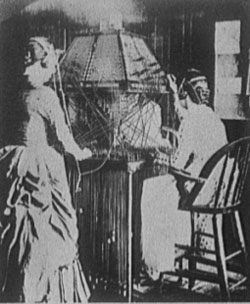More bad legislation is coming your way from the
Committee on Energy and Commerce in Congress. As if it's not bad enough that they are supporting the
Kerry-Isakson Bill or "Masha's Law," which directly equates the traffic in
child pornography (a recognizably reprehensible activity about which there is broad consensus) to downloading
copyrighted music (a practice engaged in by a wide range of consumers, some of whom contest the legitimacy of draconian new intellectual property laws), they've come up with another bill with terrible language in the fine print. The Bill would require schools and libraries to block "social networking" sites and chatrooms. This
interview with with
Henry Jenkins and
Danah Boyd presents some more compelling reasons to object to this badly drafted legislation. First, the legislation is so vaguely written that it could bar a number of educational online activities. Second, it would deepen the digital divide by disenfranchising poorer children who depend on public terminals for Internet access. Third, there's a lot of valuable creative activity taking place on the site: kids are posting clever audio remixes, satiric videos, elaborate Flash animations, and artful Photoshopped images on MySpace along with the pictures of face-to-face interactions and diaristic expressions of teen angst and idealism. Finally, it's a space for experimenting and learning about online identity formation, which is part of the cultural literacy of most American citizens today.
Unfortunately, as Jenkins implied in a recent manifesto on
How to Break Out of the Academic Ghetto, even his own university scholarship could be irrelevant to fast-changing contemporary debate. This week there've been
hearings about the
Deleting Online Predators Act of 2006, although academic researchers were certainly underrepresented on their "expert" panel. Apparently fueled by prurient tabloid-style stories in the mainstream media like those archived on
My CrimeSpace, the public is demanding action. (Energy policy, of course, is a subject about which the committee can't be bothered.) You can watch the two-hour hearing
webcast, if you're a glutton for virtual punishment.
Beth Yoke made a valiant attempt to defend the need for intelligent information literacy policies for the young on behalf of the American Library Association, but she was only one of two witnesses without a corporate or law enforcement agenda.
Amanda Lenhart of the
Pew Internet & American Life Project also mades some appeals to logic with statistics. But even a civil servant from the Fairfax County Public Schools,
Ted Davis, was hawking proprietary software, specifically
Symantec Web Security.
Another shameless opportunist among the witnesses was
Parry Aftab, who is behind the horrible
YFly site with former Backstreet crooner Nick Lachey, which brings kids all of the consumerism and none of the creativity of such sites. Ironically, much of her
evidence in her testimony actually supports the cultural value of social networking sites. Of course, I can understand why Lachey would be so opposed to MySpace. Intrepid teens could actually find some decent tunes there, like the
Mexican Institute of Sound or
Neil Young's anti-war album, unlike the drek that the record companies are serving up.
As a rhetorician, what I found interesting, from listening to the webcast, was the number of times the metaphor of the Internet as a "double-edged sword" kept coming up. The instrumentality and violence of the image is telling and may suggest a certain rhetoric of reaction.
I'm a Facebook member, albeit a lurker, and I have to say how impressed I am by some of my former students who have added me as a friend. They seem to have already internalized the good advice at Cornell's
Thoughts on Facebook advice page for undergraduates. When I write letters of recommendation for them, I can sketch out a more detailed picture of volunteer activities and membership in campus cultural groups. I've heard about faculty snooping for dirt on their students, such as evidence of drunken parties or on-campus drug use from
The Wired Campus of the Chronicle for Higher Education, but wouldn't it be better to spend our time figuring out how to derail some of this bad legislation being debated in the House and Senate?
As a former employee of the LA Department of Children's Services and California Youth Authority and as a parent myself, I'm certainly not a cheerleader for kiddie porn. But I can tell you from my own experience in the field, in which I was once certified, the vast majority of sexual abuse of children is committed by members of the victim's family in the context of face-to-face interactions. Like terrorists, pedophiles are being used as monsters for rhetorical purposes to muzzle debate about Internet policy.
Labels: congressional legislation



















